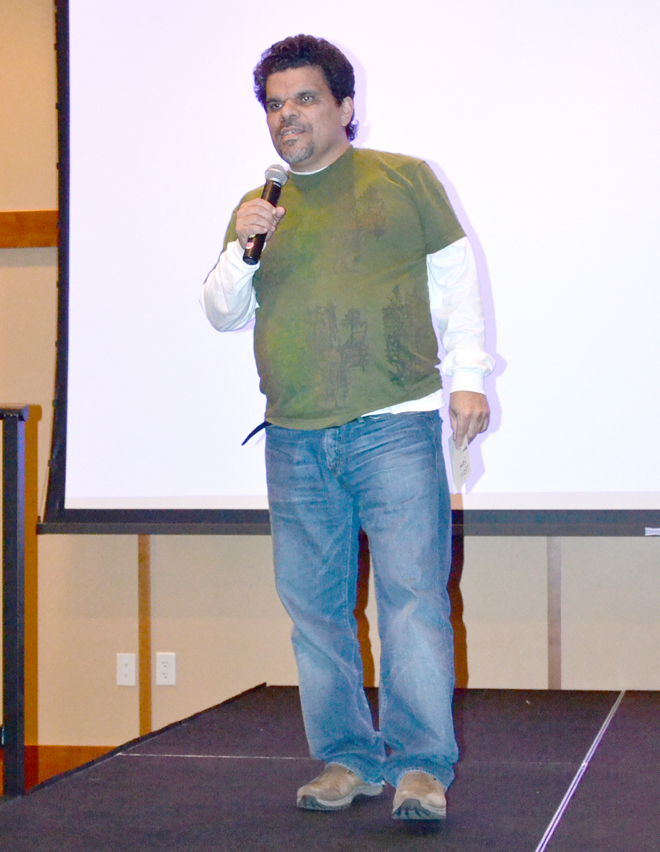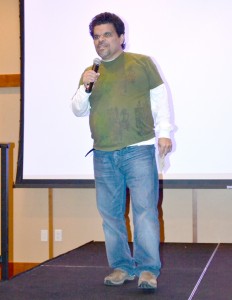
copyright the Chronicle 3-27-2013

by Bethany M. Dunbar
JAY — When Luis Guzman was growing up in the Lower East Side of New York City, his mother always made too much supper for the family.
Every night, she packed up the leftovers and gave them to her son to take under the bridge to homeless people.
“That’s how my mom raised me,” he told people who came out to see his new movie at the Foeger Ballroom at Jay Peak Friday night.
Called The Nimby Project, it’s a documentary showing Mr. Guzman’s three days living in disguise as a homeless person in the city where he grew up and worked as a social worker before going into acting.
The idea for the film was born one evening in the city, when Mr. Guzman — who lives part of the time in Sutton — was hanging out with an old friend who grew up here, Tim Kavanagh. The two came up with the idea, and as Mr. Kavanagh put it, “It just flowered from there.”
The movie was made by Pick it up! Pictures. Jacquelyn Aluotto is the producer and director and chief executive officer of the company, whose mission is to address homelessness, domestic violence, and associated social issues through film.
Ms. Aluotto’s touch has made The Nimby Project more than a straight documentary. The film is informative, but it’s also quite beautiful — it shifts from color to black and white, shows grainy dark images at times and intricate details at other times. Blues guitar music is in the background.
Statistics and quotes are shown in between scenes of Mr. Guzman’s efforts to find a place to sleep, some food, and to get people walking by to notice his cardboard signs. “Love is your Legacy” says one.
Mr. Guzman discussed the project before the premiere showing Friday, answered all questions afterwards, and hung out to just chat with the people who came out. Proceeds from the premiere event went to Northeast Kingdom Youth Services, which helps youth in transition. Last year the service helped 34 homeless youth, said Marion Stuart, the executive director.
Lexie Shaw, a teen Miss America contest winner from Chittenden County, read a poem she wrote about homelessness.
The Nimby Project film will be a headliner at the Soho International Film Festival in New York on April 6.
Mr. Guzman said that once he had decided to go homeless for a couple of days, he began to think about how to prepare for that experience. First of all, his producers talked him into making it three days instead of two. He would wear a microphone, and there would be security within view but not immediately close to him.
He thought to himself, maybe I should eat less, sleep less, stop shaving, keep socks on for a week, sleep on the floor.
He finally ended up deciding it wasn’t something he could really prepare for. “I just kind of dove into it.”
He got some hair and makeup work done so people would not recognize him. He wore a wool cap and thick glasses, a ripped shirt, and he carried a backpack. He said he got into an argument with his producers, who wanted him to engage with the actual homeless people and get their stories. Instead, he wanted to just experience it himself. Also, he said, a lot of homeless people are extremely territorial.
“You just can’t go into their space,” he said.
One of his first stops was a food pantry, where he was given a bag of food, including raw broccoli and other vegetables.
“Eggplant I would not recommend eating raw,” he said. But the broccoli was good to have.
After that, he headed out onto the streets. Very quickly, he began to realize that people do not look at a homeless person or acknowledge his or her existence, for the most part.
“You’re a nobody. Dogs notice me more than people,” he said.
Out of 1,000 people who walked by, one or two would say hello, and a couple of people handed him some money, although he did not ask for it.
The first night he had to find a place to try to sleep. He found some shelter in a nook near a bus stop, but real sleep was not possible. Even though he knew he had security around, the city noises and the hard ground kept him awake.
The second and third days of his adventure, sleep deprivation was a big factor.
“What you end up with basically is a broken kind of sleep,” he said. On one of the nights, he slept in a church,
“Today feels like a very weird day,” he said into the microphone on the second day. “It’s like I just don’t even exist today.”
Walking by the United Nations, he considered going inside and making a statement: “I am a citizen of the world, and I would like to address the assembly.”
He decided against it.
“I often think of what kind of world we’re leaving our children, and it sucks right now,” he said into the microphone.
One the second or third day, he made a cardboard sign that said, “I See you. See me?”
He sat on the steps of the Metropolitan Museum and finally, what he was waiting for: a woman came up to him and said, “I see you.”
After the film he said that was the highlight of his three-day experience. The worst part — a bad hot dog given to him by a street vendor when he didn’t have quite enough money to pay for one. The hot dog was not cooked or went bad somehow, and it made him sick.
Mr. Guzman said he walked about 30 miles in three days because, for the most part, he just felt like the best thing to do was to keep moving.
One man said he looked familiar, and another actually recognized him. A young man came up to him and said, “You look like Luis Guzman.” Mr. Guzman told the young man he WAS Luis Guzman and they were working on a documentary about homelessness.
After the film, Mr. Guzman was asked why he told the man the truth. He said he decided he wanted to be honest, and by then he had been out on the streets ignored for a long enough time that it felt really good to be recognized.
“I needed to acknowledge the fact that somebody recognized me,” he said.
Mr. Guzman said he learned a lot from the experience, and he hopes it will help draw attention to the problem. He met people who were homeless even though they had nine-to-five jobs.
“Not every homeless person is a nut job,” he said, asking those in the audience to consider how easy it would be to become homeless. For some, it’s a matter of losing a job, a spouse, or a parent.
Mr. Guzman said making this movie was “the most amazing thing outside of being a dad that I’ve ever done.”
In his mother’s tradition, Mr. Guzman takes his four adopted children and one birth child to volunteer at soup kitchens on Thanksgiving Day.
He said he knows that people can’t give every homeless person they walk by a dollar, but sometimes a simple acknowledgement of their existence could be a bright spot in that person’s day. If you don’t have money, you can volunteer or bring clean, folded clothing you don’t need to a homeless shelter.
Mr. Guzman has appeared in more than 60 movies, including Crocodile Dundee 2, Carlito’s Way, Traffic, Anger Management, Fast Food Nation, and Disappearances based on Howard Mosher’s book. He’s also been in advertisements for “naturally aged cheddar hunks” for Cabot Creamery.
He told the audience at Jay that he’s been in Vermont for 20 years so he is no longer a flatlander. The Northeast Kingdom is a “beautiful, wonderful place for children to grow up,” he said.
“When I first moved to Vermont, everybody thought I was crazy ’cause I was a New York City boy.”
But he loved it here, especially after learning how to build a fire and some things about predicting the weather. He said he tried and tried to build a fire and when he finally could do it, he was so excited.
“I was down to my last match that day,” he said.
He came to Vermont first to Goddard College and decided he really liked the people, who he said are cool and laid back.
He said he learned that when the cows lie down or the tree branches’ bottoms show, it’s going to rain. He told his city friends, who laughed at him until they found out he was right.
Some statistics from The Nimby Project:
Three million Americans are homeless. One thousand soup kitchens turn away 2,500 people every day. One million, four hundred thousand people in New York City rely on foodshelves. The average age of death for a homeless person is 47 for men, 43 for women. Every 53 minutes a child dies from poverty.
Also from the movie, a quote from Mother Theresa:
“The most terrible poverty is loneliness and the feeling of being unloved.”
Mr. Guzman said he was humbled by his three-day homeless experience, and grateful for his own real life and his family.
contact Bethany M. Dunbar at [email protected]







